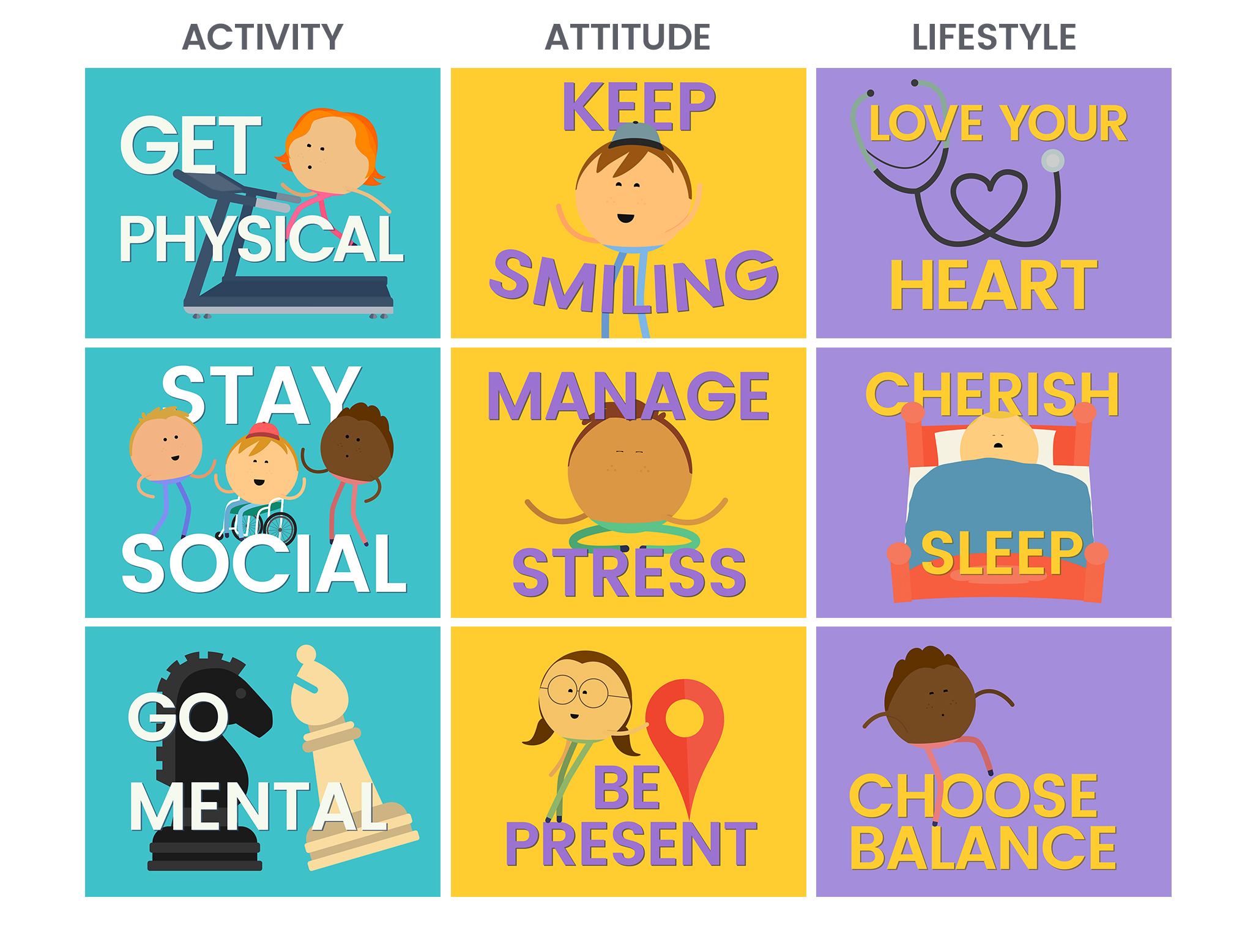
Teenagers can be very busy. Teenagers place more emphasis on dating and socializing, than on basic self-care such as nutrition and exercise. These are important for their mental and emotional health. Below are healthy living tips to help teenagers reach these goals. You should also make sure that your teenager has plenty of time for friends and rest. Teenagers can feel great about themselves by practicing healthy living habits.
Limit screen time to two hours per day
Parents are often encouraged to limit the time that their teenagers spend in front of screens. There are several factors to consider when making such a decision. In addition to age and activity level, it is also important to consider whether the time spent using screens is limiting their children's social and academic development. In 2016, American Academy of Pediatrics revised its guidelines for screen time. Children and adolescents should limit their exposure to TV or any other screen media for no more that two hours per day.
Keep your social media active
Monitoring your teen’s social networks is a key part of your daily parenting plan. Monitoring your teen on social media is a must. Make sure that you are the first friend they add. This will help you build a relationship and inform your teen about potential dangers. Teenagers shouldn’t share personal information on social networking sites, especially if they are sharing their personal information.

Get enough sleep
Teens feel that they are not getting enough sleep. Teens require more sleep due to their bodies growing quickly and need time to relax. Here are some tips to help your teenager sleep eight hours a night. To minimize the impact of schedule changes, teens should get up around the same time every day. However, if you are unable to get your teenager to wake up on time, you may want to give them some time on the weekend.
Enjoy fresh food
Teenagers need to eat at most 3 meals per day. Avoid diet foods that exclude whole food groups. Fad diets are often devoid of proper nutrition. This could lead to your teen lacking in vitamins and minerals. Model a healthy lifestyle to keep your teen on track. Limit sugary drinks and eat lots of fruits and vegetables. Avoid late-night snacking and make fresh vegetables and fruits your mainstay of snacks after school.
Stay hydrated
Children need to be hydrated. Water is good for your child's overall health and well-being. It also keeps them awake and alert. Cool beverages, such as water or sports drinks, are especially refreshing on a hot day. Make sure to keep them hydrated by making water easily available and offering frequent breaks.

FAQ
Why is it important for improving emotional health?
Your emotional health is vital for your happiness and well being. Without emotional health, you will not be able work at your best. People suffering from depression often have difficulty working. Anxiety, panic attacks or insomnia may be common symptoms. The good news about these conditions is that they can be successfully treated using medication and therapy.
What should I do when I'm experiencing mental health problems?
It is crucial to seek out help if you are struggling with any mental health issues. Perhaps you've been through trauma or suffered abuse in the past. This could have affected your perception of yourself.
You may also be suffering from an eating disorder, addiction, or another type of mental illness. These disorders can lead to severe life-altering consequences.
You shouldn't try to deal with them on your own. Instead, you should talk to someone who knows what they're doing. You can get the support you need from a professional therapist to help you overcome these difficulties.
What are some mental-emotional issues?
Mental disorders include any condition that causes significant distress or impairment in functioning. Examples of mental disorders include depression, anxiety, bipolar disorder, schizophrenia, borderline personality disorder, obsessive-compulsive disorder, post-traumatic stress disorder, eating disorders, substance abuse, and others.
How can I avoid mental health issues in the future?
Preventing mental disorders is easy. Here are some points to keep your mind clear:
-
Don't drink alcohol. Drinking alcohol can cause depression and affect your mood.
-
Avoid using drugs. Avoid using drugs.
-
Sleep well. You can feel anxious or depressed if you don't get enough sleep.
-
Exercise regularly. Exercise makes you feel happy and releases endorphins.
-
Consume healthy food. You can feel tired and unmotivated if you eat junk food.
-
Spend quality time with loved ones. Spending quality time with the people you love can lift your mood.
-
Have fun. Enjoy life and try new things.
-
Retire from social media. You may feel isolated or lonely on social media.
-
Treat yourself with kindness. Treat yourself nicely, even if you aren't feeling great.
-
Ask for help. Ask for help if you are having difficulty coping. Talking to a family member or friend can be helpful.
-
Remember that it's okay to cry. Crying helps you release tension and stress. It doesn't mean anything bad happened.
-
Be busy. Do something you enjoy.
-
Good hygiene is essential. Bad hygiene can make it difficult to feel attractive and clean.
-
Stay connected. Staying connected will help you stay positive.
-
Learn how relaxation works. Relaxation techniques such as meditation and yoga can help you to cope with stress.
-
Find meaning in the things you do. Finding purpose in your job and hobbies can bring you satisfaction.
-
Focus on the present moment. When you focus on the present moment, you won't worry so much about the future.
-
Set goals. It can be motivating to set goals.
-
Do something for yourself. You can improve your self-esteem by doing something nice for you.
-
Practice gratitude. Gratitude can help to appreciate all the blessings in your life.
-
Volunteer. Volunteering can provide a rewarding way to spend time with friends and make an impact on the world.
-
Give back. Giving back can help you feel fulfilled.
-
Watch out for warning signs. If you notice any changes in your behavior, don't hesitate to reach out for help.
What causes mental health problems in adolescents?
Adolescence is when we develop our identities. We begin to figure out who we are as individuals and where we fit into society.
This is a time when we make new friendships and have romantic relationships. These experiences can cause stress.
While stress is normal, you should seek out help if your stress levels are higher than usual.
Sometimes, it is not possible to handle everything on your own.
Your friends and family members can provide support during times of stress. You can also learn strategies to manage stress from your friends and family.
Meditation or exercise are two options. Both activities can help reduce stress.
Additionally, you might consider joining a club such as a team sports or church. You will make new friends and meet new people.
Statistics
- In any given year, an estimated 18.1% (43.6 million) of U.S. adults ages 18 years or older suffered from any mental illness, and 4.2% (9.8 million) (healthypeople.gov)
- It means no drinking any alcoholic beverages and no taking any drugs that aren't 100% natural.
- Neuropsychiatric diseases are the leading cause of death and disability in the U.S., accounting for 18.7 percent of all years of potential lifespan loss and premature mortality.
- According to the National Alliance of Mental Illness (NAMI), one in five Americans experiences mental health issues which translates to more than 40 million adults a year. (doctorondemand.com)
- Appropriate nutrition and exercise are likely among the most efficacious and cost-effective positive mental health interventions. (ncbi.nlm.nih.gov)
External Links
How To
How To Care For Children With Autism
Autism spectrum disorder (ASD), is a neurodevelopmental condition that causes impairments in social communication and repetitive behaviours. ASD affects 1 in 50 people worldwide. However, there are no treatments.
The first symptoms usually appear during infancy, around 18 months old. The most common signs include difficulty understanding others' emotions, lack of eye contact, problems with language development, and difficulties in learning new skills. These symptoms can sometimes lead directly to severe behavioral problems such as aggression, anxiety and depression.
While there is no cause currently, scientists believe that genetics play an important role. ASD may be caused by factors like infection, stress, obesity, drugs, vaccines or alcohol. There is also evidence suggesting that certain viruses like rubella and measles can increase the risk of developing ASD later in life.
Early diagnosis and intervention are key to improving outcomes. Many families struggle with their child’s behavior after they turn 18. There are many treatment options available depending on how severe the symptoms are and what type of support is required. Research has shown that therapies that focus on social interaction and reducing problematic behaviors can make an impact.